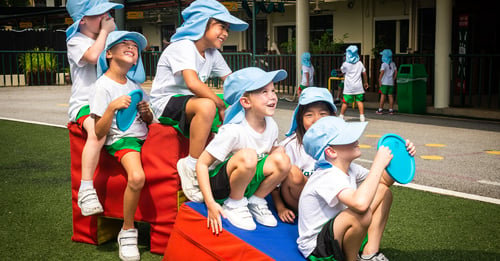When a baby is born, they have billions of brain cells and through stimulation, those cells connect to form synapses. Stimulation comes in the form of play, exploration, human interaction etc.
“Brain activity and synapse formation are at their highest when a child is deeply engrossed in something which fascinates, challenges and makes them happy.”
Anna Ephgrave, Early Years' practitioner, consultant, author and trainer.
Inspiring your child to engage in activities which do exactly this is at the root of our approach at Alice Smith Early Years. Our highly skilled and knowledgeable staff provide a challenging, rigorous and engaging curriculum. This is supported by teaching which is heavily influenced by a number of recognised approaches as to how children best learn at this age including Reggio Emilia, Anna Ephgrave, Maria Montessori and Alistair Bryce-Clegg. Environments are carefully planned and created in order to provoke learning, interest, creativity and thought.
Each child is viewed as infinitely capable and intelligent.
Our teachers provide support and challenge as our children learn through play. This creates a highly personalised and tailored environment, which is appropriately challenging for each individual child. Our aim is to ensure high levels of emotional wellbeing and involvement. This is characterised by children who are confident, comfortable, curious and eager to experiment and explore. The role of the environment as well as the teacher are continually assessed to ensure we offer a deep and challenging learning experience for all.
Outdoor Learning
The importance of outdoor exploratory play is something we are deeply aware of at Alice Smith. Across our Early Years classes, our spacious and stimulating outdoor areas provide children the opportunity to connect with the natural world and have first hand experiences of life and growth. Our outdoor space is viewed as an extension of our classrooms where children explore, risk take, develop physically and absorb vast amounts of physical knowledge.
We use these years to build strong skills base knowledge in your children in order to help them succeed.
According to Lea-Ann Robinson, Class Teacher and our Reception Year Leader, if you have a weak foundation, whatever comes after won’t be as strong.
The three prime areas of learning and development consist of: communication and language, physical development and personal, social and emotional development. These prime areas are the most essential for your child’s healthy development and future learning and are applied and reinforced by specific areas: literacy, mathematics, understanding the world and expressive arts and design.
1. Communication and Language
The acquisition of language is the single most important skill a child learns in their first five years. With this fact in mind, our teachers organise activities to be open-ended and varied to ensure the development of a rich vocabulary.
Talking to the children, asking questions, as well as giving them time to think, are two of the most useful approaches to learning according to Mrs Robinson.
This prime area includes the development of three subsections:
- Listening and attention
- Understanding
- Speaking
2. Physical Development
We take pride in our outdoor areas and the variety of open ended, high quality resources, which offer more opportunities for the children to be physical in their play, developing muscles throughout the whole body; strengthening and developing fine and gross motor dexterity, hand/eye coordination, proprioception, balance, pencil grip and independence!
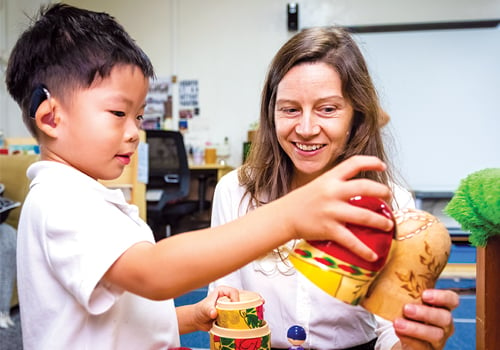
When the children select their own resources they come up with ideas and use the loose parts and objects in ways that adults could never have thought of. Watching the children design and construct is illuminating. When creating a structure on which to climb, for example, the children will test, evaluate and try again; they enlist help from their friends, or choose additional resources to support their structure. This all aids the development of higher order thinking skills.
This prime area includes the development of two subsections:
- Moving and handling
- Health and self-care
3. Personal, Social and Emotional Development
Learning the social skills necessary to interact with others and form strong relationships is of vital importance to the healthy development of every child.
In a play-based environment children can make choices and develop independence. Your children will be encouraged and supported to access resources independently, describe preferences and express their own ideas and opinions.
Allowing our children to negotiate, helps them to evaluate, understand cause and effect and manage their own choices effectively. By offering a wide range of open ended resources we are encouraging them to develop not only their imaginations, skills of cooperation, determination and perseverance but also to begin to develop the skill of risk assessment.
Our provision promotes collaboration, turn-taking and sharing in both small and large groups.
This prime area includes the development of three subsections:
- Self-confidence and self-awareness
- Making relationships
- Managing feelings and behaviour
Personalised Child Centred Learning in Action
Are the children happy? What can the children do? What do they need help with? What do they need to be able to do next? These are the questions Mrs Robinson asks herself when thinking about the direction of her class.
Mrs Robinson talked about some of the many incredible learning opportunities, where individuals are challenged and supported to use higher order thinking skills through the prime areas; communication and language, personal, social and emotional development and physical development to under pin the Specific Areas of Learning; Literacy, Maths, Understanding the World, Expressive arts and design.
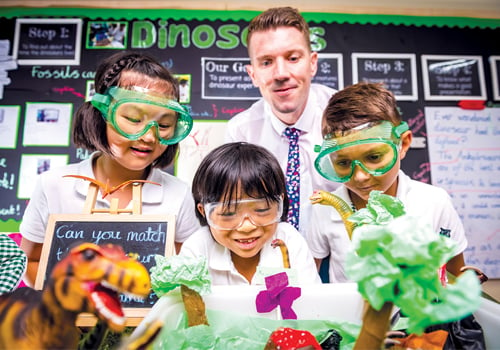
“Based on the observations I had previously made when interacting and observing the children, I knew most of the class loved sensory play and exploration, a handful were not yet confident to talk or explain their ideas/ thinking, there were also many whos next step was to accept the needs of others and take turns and share resources. Because I took the time to get to know the children and how they learn, I was able to set up provision to support and extend each learner.”
I set up a large table with a big piece of cardboard, from an old box, on top of this I placed lots of empty pots and paints all around the table. When the children arrived in the morning there were lots of questions and excitement around the provocation. I explained to the children that they could mix any colours they wanted, but there were some rules. We discussed not wasting paint and how to do this. I didn’t give the answers but adapted my questioning in order for the children to extend their thinking.
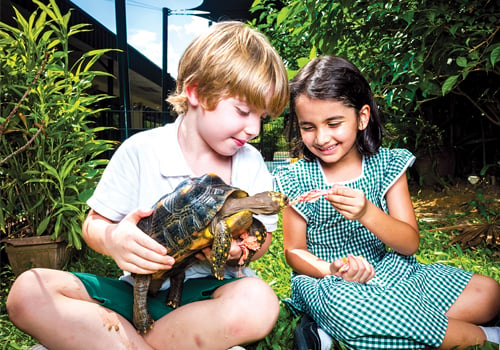
I posed the question, why do you think we should start with the lightest colour? I explained why by letting them experiment with a darker colour first. We then talked about why the colour didn’t change significantly and tried using the lightest colour first. This helped the children gain an understanding while investigating and having fun. After hours of free flow engagement, the colours that were mixed were amazing. The children were focused, explored, problem solved, created, collaborated and concentrated for extended periods of time.
The exceptional learning that happened couldn’t have occurred if I had a detailed, planned ‘activity’ or if I hadn’t taken the time to get to know the children, their interests and how they learn. Allowing the children the freedom to discover and learn from trial and error, created an infectious energy that draw more children than could have been expected.
We covered all areas of learning in different ways based on the needs of the children and their next steps. The provision was adapted over a few days and the engagement continued to flourish.
It was purposeful because they were discovering and learning new concepts independently. The children were helping each other, there was teamwork; a few children who have speech delays were talking and calling other children over. It was truly wonderful.”
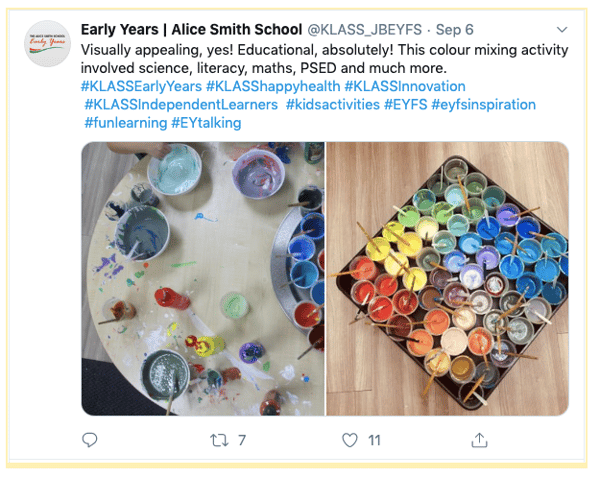
Follow the fun in our Early Years Programme on Twitter.
How Does Play-Based Learning Help Your Child?
Play-based learning creates a treasure-house of wonder and joy for curious young minds. Teachers take the time to observe play, children's interactions and how individuals learn; they get to know your children and therefore are able to facilitate the right next steps.
But what are two specific ways a play-based environment can help your child?
1. Infinite Achievements
“When a child plays they have no fixed agendas, no preconceived objectives that they are trying to cover, and therefore there are no limitations to what they can achieve,” said Mrs Robinson .
While your children play, they’re exploring, hypothesising, experimenting and discovering, giving their little minds a chance to think out complex ideas without really even knowing they’re doing so.
Through play, your children will develop skills such as problem-solving, creativity, collaboration, social interaction, concentration and self-confidence. According to Mrs Robinson, it also helps them develop a lifelong love of learning.
2. Children Take the Lead on Learning
In a play-based environment, children take a leadership role when it comes to their learning depending on their interests.
“Adults are not there to dictate or run-the-show but to get to know the children so they can support and extend learning,” said Mrs Robinson.
For many parents, a child-led, play-based approach to learning is a relatively new concept. According to Mrs Robinson, to truly understand just how beneficial this type of learning is to your children, you need to see it for yourself.
We invite you to book a tour to explore our Primary Campus, meet Mrs Robinson and see how our students love leading their learning.


